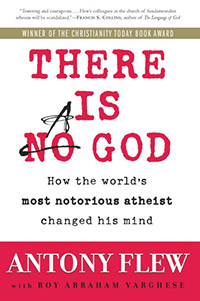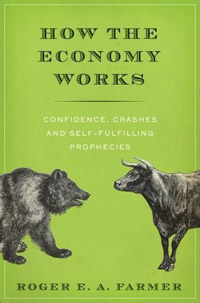
Skepticality

Manga and Science
The hosts of Skepticality love opportunities to introduce listeners to innovative ways of communicating skepticism. This week’s guest is a perfect example. The award-winning creator of graphic novel Secrets of Sorcerers, Sara E. Mayhew is a professional illustrator who specializes in manga artwork that embraces critical thinking.
In 2009 Sara became a TED Fellow (“Technology, Entertainment, Design”) — part of a distinguished program built on the power of ideas to change attitudes, lives and ultimately, the world. She spoke about her goal to use the art of manga to teach young readers about science and critical thinking through engaging stories and images. She spoke again at TED 2010, and recently spoke at the Center for Inquiry: Los Angeles on the topic of “Skepticism Through Manga.”
This week, Swoopy talks with Sara about her new manga, Legend of the Ztarr (the story of a young girl on a far off planet who must ultimately utilize critical thinking and science to help save her world) and about her popular critical thinking blog, There Are Four Lights.
MonsterTalk
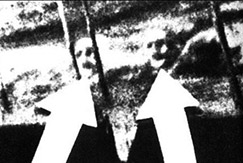
Historical Ghost Investigations Part II:
Sinking the Watertown
This week, MonsterTalk continues its two-part discussion of historical ghost investigations. Blake Smith describes his investigation into a famous photo that allegedly shows two dead sailors floating off the side of a 1920’s oil tanker. Methodology for conducting historical investigation is detailed, using Ben Radford’s upcoming book on scientific paranormal investigation as a basis for the talk.
Did two sailors haunt their fellow shipmates? Does the photo really show two ghosts? Find out the answers in this informative conclusion — and find out how you can solve your own cases!
The Remarkable Story of Professor Antony Flew —
The World’s Most Notorious Atheist Who Changed His Mind
On April 8, 2010, the British philosopher Antony Flew passed away after a long life in academic philosophy, having taught at Oxford, Aberdeen, Keele, and Reading universities. For most of his career Professor Flew was one of the world’s most outspoken and prominent atheists, until he changed his mind in the closing years of his life, apparently impressed by the arguments from Intelligent Design creationists, most notably with regard to the complexity of DNA. In 2004, Flew co-authored a book entitled There is a God: How the World’s Most Notorious Atheist Changed His Mind. The co-author was Roy Abraham Varghese, who became the center of controversy when the New York Times published an article alleging that Flew was in serious mental decline and that the book — and by implication the conversion itself — was perhaps contrived or highly influenced by Varghese.
In this week’s eSkeptic, we present the following article by Kenneth Grubbs, which was written before Flew died and aims to get at the truth of Flew’s conversion. Kenneth is a long-time skeptic and freelance writer living with his family in Southeast Michigan. Kenneth also writes for the free-thinking website Isaac’s Rainbow.
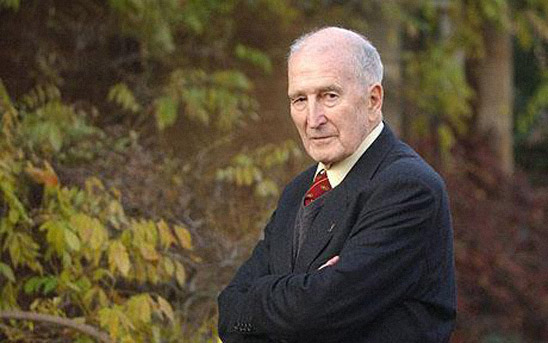
Antony Flew (photo by John Lawrence)
Antony Flew, 1923–2010
Following the Argument Wherever it Leads
a tribute by Kenneth Grubbs
A bristling chill swept the dimming colorless sky over Reading, England one evening earlier this year. In weather uncannily, perhaps even poignantly, similar it was my profound pleasure to speak at length with the delightful and charming Annis Flew, wife of the now notorious Antony Flew who, after almost 70 years vigorously defending atheism apparently changed his mind. Today, at the age of 87, Flew considers himself a deist. At least that is what Annis made clear to me when we spoke in January.
Flew, The Man
At the University of Oxford, during the war-ravaged 1940s, a group of undergraduate students, presided over by C. S. Lewis, gathered each Monday evening below ground in the Junior Common Room of St. Hilda’s College to passionately debate Christianity and atheism.
This elite group, known as The Socratic Club, was the “intellectual hub of Oxford.” At its core is the Socratic maxim to “Follow the argument wherever it leads,” a principle that would guide Flew his entire life. It was here at the Socratic club in 1950 that a 27-year old Flew presented his first relevant work, Theology and Falsification. It was also here at Oxford that he would meet Annis, the woman who would become his wife and lifelong friend and the woman with the kind and steady voice I would speak with on a crisp January evening, some 60 years later.
Professor Flew authored more than 35 books and essays on such diverse philosophical topics as free will and determinism, crime, evolution, logic, ethics, and language. His landmark works include God and Philosophy (1966), The Presumption of Atheism (1976), and now, of course, There is a God: How the World’s Most Notorious Atheist Changed His Mind (2007). I tried to gain access to Professor Flew for this story, but he was in an Extended Care Facility in Reading, England, tired, confused, and in the paralyzing grasp of advanced dementia. He had been there for well more than a year, and Annis informed me that “Tony is rarely aware of his surroundings anymore.” There would be no interview.
Flew, The Book
There is a God was published in 2007 by Harper One, the imprint of Harper Collins focusing on predominantly religious and spiritual works. The book is “about why I changed my mind,” Flew writes. His name appears in large print on the jacket. Below it, in considerably smaller type, it reads “with Roy Abraham Varghese.” From the jacket we also learn that the book is the “Winner of the Christianity Today Book Award.” This is a curious honor, given that deism shares almost nothing with Christianity, nor any other religion; but far more importantly, Annis informed me without hesitation that “Tony never came to recognize any of the revealed religions.”
Roy Varghese penned the 18-page Preface. The Introduction is written by Flew, spanning four and one half pages. In it comes the thunderous recant, “I now believe there is a God.” There are two Appendices. Roy Varghese writes the first. Its 22 pages consist of one part “New Atheist” bashing, and two parts tiresome argument. Bishop N.T. Wright, an Oxford New Testament Scholar, writes the second appendix. Before Wright begins his 28-page essay, “The Self-Revelation of God in Human History: A Dialogue on Jesus,” there is a brief paragraph by Flew inviting Wright to contribute, an odd invitation from a deist.
Flew, The Controversy
In December of 2004, 54 battle weary years after Theology and Falsification was first introduced at the Socratic Club, a lifetime of work was forever fractured when the Associated Press released the story that Antony Flew, famed British philosopher and atheist, “now believes in God.” In 2007, not long after Flew’s book was released, Mark Oppenheimer wrote an essay in the New York Times magazine (“The Turning of an Atheist,” November 4), for which he interviewed both Flew and Varghese. I spoke with Mark in February, who told me that Professor Flew informed him with no ambiguity that he did not write the book. “This is really Roy’s doing,” Flew said, “He showed it to me and I said OK.” When Oppenheimer interviewed Varghese, he too stated that the book was his idea, and that he (Varghese) “did all the original writing,” but that the “substantive” material came from Flew’s previous work. Oppenheimer describes Varghese as a Christian apologist as well as a “crusader for (and financial backer of) those who believe that scientific research helps verify the existence of God.” Varghese met Flew at a conference in 1985.
Subsequent to Oppenheimer’s story, Varghese wrote a letter to the editor of the New York Times magazine: “First the good news: Antony Flew is alive and well (physically and mentally)” (“Doubting Antony Flew,” November 5, 2007. This letter was written just one year prior to Flew’s dementia requiring hospitalization).
When I spoke with Mark he reminded me that Harper One wasn’t entirely satisfied with Varghese’s prose, so they asked Bob Hostetler, an evangelical pastor, to re-write many of the passages, “To make it more reader friendly,” according to Varghese himself. So the ghostwriter had a ghostwriter!
In essence then, two-thirds of Antony Flew’s book is actually Roy Varghese writing for Flew, with some undefined portion written by Bob Hostetler writing for Varghese. The remaining one-third of the book is Varghese writing as Varghese, taking puerile whacks at the “New Atheists” in Appendix A; and Bishop Wright in Appendix B, writing as Bishop Wright, presenting his 28-page Christian dissertation. As Annis said, “All those Christians [were] trying to pull him to their bosom.” Yet almost unbelievably, nowhere in There is a God is any of this information disclosed. The omissions alone are disturbing. “The most disappointing thing to me,” Oppenheimer told me, reflecting back with clear candor, “is the cynicism of the publishing industry. They knew they made a mistake, and never took the opportunity to correct it.”
Roy Varghese declined my request for an interview. He did email me a written statement to highlight three points. First, he explained that the statements made in the book have been made by Flew in other forums as well. Second, Flew signed off on the book’s manuscript multiple times. And third, Varghese arranged a special meeting attended by himself, Professor Flew and Professor Richard Swinburne, famed Christian apologist and long time friend of Flew. The expressed intent of the meeting was for Swinburne to assess Flew’s genuine views, as well as his capacity. Swinburne wrote a testament proclaiming Flew’s grasp of the material, suggesting that Flew’s position was “most of the way toward Christianity.” (Varghese was kind enough to send me a copy of Swinburne’s statement).
The fact that Varghese felt the need for a third party confirmation regarding Flew’s capacity raises concerns. And having decided that such a confirmation was necessary, it would have been more persuasive had a truly independent third party, rather than a Christian apologist, conducted it.
Of the three important points Varghese wanted me to know, point number three negates points one and two. If Flew’s capacity is questionable to Varghese, then the credibility of expressing his newfound views in other forums and signing off on manuscripts is not compelling.
At this juncture then, having reviewed the controversy, having considered Flew’s age and capacity, and having considered the potentially biased motives of those around him, our story finally intersects with its purpose. Simply put, these antics are of no relevance to us here. Why? Because the Socratic maxim so dear to Flew’s heart is not to follow the man; it is instead to follow the argument. Professor Antony Flew affirms that he is a deist; so stipulated. We will follow the argument and see where it leads.
Flew, The Argument
When someone abandons lifelong convictions, changes their mind, and writes a book to explain it all, we should expect new and dramatic reasoning. Let’s follow the argument spelled out in There is a God.
“Science spotlights three dimensions of nature that point to God,” the argument begins in earnest, summarily invoking the authority of science. “The first is the fact that nature obeys laws. The second is the dimension of life, of intelligently organized and purpose-driven beings, which arose from matter. The third is the very existence of nature.”
Notice that these points are nothing more than observations for which science is seeking evidence. They are, in and of themselves, not evidence per se, nor do they “point to” anything, despite the semantic implications to the contrary.
The argument continues, “How did the laws of nature come to be? How did life as a phenomenon originate from non-life?” And lastly, “How did the universe, by which we mean all that is physical, come into existence?”
The three scientific observations preceding these questions have been carefully crafted into questions from which the inferences, according to the authors, can only be God. Put more simply, the unspoken conclusion we are to infer is, what else could it be, but God? This is the backbone of the argument for deism. The enigmatic truth that biology and cosmology remain confounded by these questions has been creatively reconstituted into would be articles of evidence.
Flew/Varghese argue that, “Perhaps the most popular and intuitively plausible argument for God’s existence is the so-called argument from design.” Having now read hundreds of pages of masterfully constructed arguments from this classically trained Oxford philosopher, in my opinion Professor Flew would shudder at the notion of employing “popular” or “intuitively plausible” statements as arguments for or against anything. They write, “What I think the DNA material has done is that it has shown, by almost unbelievable complexity of the arrangements which are needed to produce life, that intelligence must have been involved.”
Consider this passage from God and Philosophy, written by Flew in 1966: “Certainly it is proper to feel the awe in the contemplation of the human eye or of the single living cell. But no exploitation, however breathtaking, of the limitations and potentialities of materials would give good ground for inferring Omnipotence.” So what changed? Did complexity became more complex? Did design became better designed? Is Flew’s qualification, “however breathtaking,” invalidated by the complexity of DNA?
Another cornerstone of any argument for deism is the Anthropic Principle. Flew/Varghese submit the weight of electrons, the speed of light, and gravitational constants to demonstrate that the universe is too “fine tuned” to be accidental. Again, these observations contribute nothing substantive — they are simply statements about the universe, not packets of data’ — save the same misleading implication what else could it be, but God? The authors conclude: “The only satisfactory explanation for the origin of such ‘end-directed, self-replicating’ life as we see on earth is an infinitely intelligent Mind.” The logic proffered fails as an argument because it requires us to accept the lack of knowledge as knowledge, and the lack of evidence as evidence. This is Argumentum ad Ignorantiam, or, appeal to ignorance. It is also the Burden of Proof Fallacy, which states that if we cannot prove X to be false, then X is true; the inability to disprove X becomes the proof of X. The argument is of course invalid.
Bertrand Russell was fond of suggesting that a teapot orbited the sun just beyond Mars; no one can disprove his claim, therefore it is true. If we follow the this line of reasoning we must accept the conclusion that the more evidence we lack … the greater the likelihood that God exists. The argument beckons for God to be defined as “the sum of all knowledge yet acquired.”
This was the reason Flew wrote The Presumption of Atheism back in 1976. It was written to mirror the legal maxim, Ei incumbit probation qui dicit, non qui negat, or “The onus of proof lies on the proposition, not on the opposition.” Flew noted in that book: “If it is to be established that there is a God, then we have to have good grounds for believing that this is indeed so. Until and unless some such grounds are produced we have literally no reason at all for believing.” The absence of evidence hardly qualifies as “good grounds” for anything, much less god, and thus our expectations for some epiphanic insight to leap from the pages of this book and help us understand the basis for Professor Flew’s recantation have been thoroughly dashed.
The landscape of science has changed in almost unrecognizable proportions since Flew’s early life. However, it is unreasonable — irrational even — to suggest that Flew’s original position opposing complexity as an argument for a Divine Mind was only a matter of degree. If complexity is a poor argument for the existence of God (and it is) then the degree of complexity is an irrelevant attribute.
Flew, The Conclusion
As a species our hunger for answers is insatiable. So desperate are we to understand the universe around us that for untold centuries we have refused to accept any “gap” in that understanding. Unexplained phenomena are the spawning grounds for ghost stories, sea monsters, grassy knolls, and a Divine Mind.
Antony Flew understood this as well as anyone. He devoted a lifetime of vigorous intellectual argument against presuming God. Today we are asked to accept that he has changed his mind. With asterisks in hand, we accept.
Could we make a cogent argument “pointing to” his age and capacity as factors that might mitigate a change of this magnitude? We could. Are there uncertainties that could warrant a tenable challenge to the motives of those individuals surrounding Flew, with regard to his “conversion” and the curiously construction and authorship of the book? There are. Should the publishers bear any responsibility for preventing misperceptions concerning the disclosure of would-be ghostwriters? They should.
There is little hope of ever reconciling the Antony Flew of 87 years with the Antony Flew of 27 years. Did he change his mind, or did his mind change him?
History will record Antony Flew as a deist; Annis Flew confirmed that for us all. History, I fear, becomes an unwitting conspirator, forever defiled.
With so many varied aspects to this story, it is easy to forget that which matters most. Antony Garrard Newton Flew, philosopher, professor, author, atheist pioneer, and devoted husband, is now gone. For more than 60 years this thinker, this man of great intellect, marched to a different drum and followed the argument. We owe him much.
The last of the old guard, Professor Flew’s festschrift deserves to be written with admiration and respect for a distinguished philosopher. As Annis said to me, her accent reminiscent of British Royalty and her voice never wavering, “I am so very proud to have known him.”
Skeptical perspectives on ID Creationism at Shop Skeptic
-
 How to Debate a Creationist
How to Debate a Creationist
(27 page booklet $5.00) by Michael Shermer -
Includes sections: 25 Creationist Arguments & 25 Evolutionist Answers; 10 Intelligent Design arguments and 10 answers; What is Evolution?; Relationship between science and religion; Creation mythology around the world; Old and New Creationism; Intelligent Design Theory and its Discontents; Explanatory gaps, and more…
-
 Geology, Creationism, and Evolution
Geology, Creationism, and Evolution
(DVD $23.95, CD $15.95) by Donald Prothero -
Have you ever had to deal with a Creationist who takes the Genesis accounts literally, and who insists that the biblical story of Noah’s flood can account for all the geologic features of the earth, as well as all the creatures that survived on the ark? In this lecture, Dr. Prothero discusses the biblical and logistical problems with “flood geology,” and shows how creationists’…
-
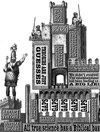 The New Creationism: Intelligent Design Theory
The New Creationism: Intelligent Design Theory
(DVD $23.95, CD $15.95) by Robert Pennock -
Dr. Pennock delivers a superbly organized lecture and a thorough analysis and refutation of the latest new arguments from the new creationists. Covers Intelligent Design theory, Irreducible Complexity, and makes a brilliant analogy between the evolution of life and the evolution of language (neither one had a top-down designer), to show the deep flaws in creationists’ reasoning.

NEW ON SKEPTICBLOG.ORG
Why We Are Hardwired for Belief in God
On April 10 the Wall Street Journal published a debate between Michael Shermer and Gregory Paul on the question of whether or not belief in God is innate. The online version was well edited but shorter than Shermer’s original draft, which he presents here (just for the record).
NEW ON MICHAELSHERMER.COM
The Sensed-Presence Effect
Michael Shermer discusses the phenomenon of how the brain produces the sense of someone present when no one is there.
OUR NEXT LECTURER:
economist Dr. Roger Farmer
How the Economy Works:
Confidence, Crashes & Self-Fulfilling Prophecies
Sunday, May 2, 2010 at 2:00 pm
Baxter Lecture Hall, Caltech


